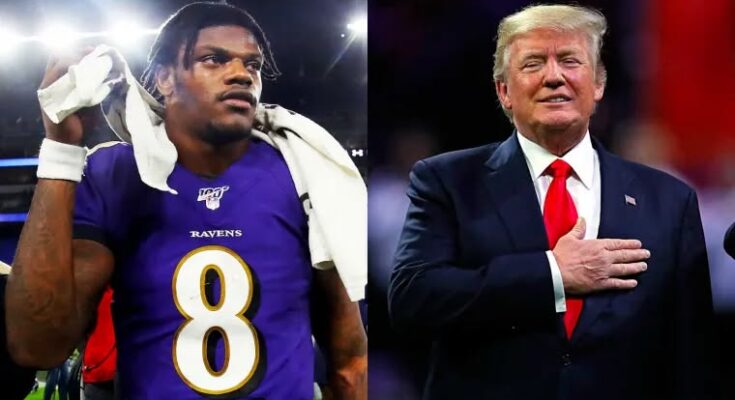In the volatile arena of social media, where old posts are perpetually resurrected and scrutinized, an innocuous, seemingly appreciative tweet from Baltimore Ravens quarterback Lamar Jackson regarding Donald Trump has recently resurfaced, igniting a fresh round of debates and diverse responses. The original tweet, dating back to April 2020, saw Jackson respond to a post by then-President Trump with the phrase “Truzz Trump.”1 This brief interaction, initially interpreted by some as a political endorsement, has once again become a flashpoint for discussion, highlighting the complexities of public figures navigating political discourse online.
The original context of the tweet is crucial to understanding the nuanced reactions it elicited then, and even more so now, in mid-2025. In April 2020, a video clip from the 2018 NFL Draft resurfaced, showing Jackson’s former college teammate, Jaire Alexander (now ironically reunited with Jackson on the Ravens), celebrating wildly when Jackson was drafted by the Ravens.2 President Trump retweeted this video, commending the selection and praising Jackson, remarking, “Really nice to see this and, what a great pick!” Jackson’s reply, “Truzz Trump,” was a nod to his personal mantra and tattoo, “Truzz” (meaning trust), combined with Trump’s name.3
At the time, Jackson quickly moved to clarify his intent. In April 2020, during a media availability, he stated unequivocally that his tweet was not a political statement or an endorsement of Trump’s policies.4 Instead, he explained, he was simply “agreeing with the sentiment expressed by Trump,” who was complimenting him and his teammate. “I was just having fun with it,” Jackson said, emphasizing that he was acknowledging the compliment. He further clarified, “I wasn’t making any political statement or anything like that… I was just agreeing with the way he was talking about me and my teammate. That’s all.” This explanation aimed to de-politicize the interaction, framing it as a simple act of acknowledging praise.
Fast forward to mid-2025, and the resurfacing of this five-year-old tweet has reignited a spectrum of responses on social media:
1. Renewed Political Interpretation and Debate:
Despite Jackson’s original clarification, many users online have once again interpreted the “Truzz Trump” tweet through a purely political lens.
- Support for the ‘Endorsement’ View: Some users, particularly those who align with Trump’s political ideology, have reposted the tweet as evidence of Jackson’s perceived support, hailing him as a “patriotic” or “common-sense” athlete. This group often dismisses Jackson’s past clarifications, choosing to see the direct reply as an undeniable alignment.
- Criticism and Disappointment: On the other side, users who are critical of Trump or who expect athletes to align with progressive causes have expressed disappointment, confusion, or even condemnation. They might argue that regardless of intent, an athlete of Jackson’s stature should be more mindful of how their words are perceived, especially when interacting with a polarizing political figure. This group often highlights the racial and social justice issues prevalent in society, questioning why an African-American athlete would appear to support a figure who has been widely criticized by many within those movements.
- Calls for Consistency/Hypocrisy: Some debates center on the perceived inconsistency of athletes or public figures. If other athletes are expected to be politically vocal, why shouldn’t Jackson’s past tweets be scrutinized for their political implications? Conversely, others argue that athletes should be allowed to express themselves without every word being politicized.
2. Defense of Jackson’s Original Intent:
A significant portion of the responses, particularly from long-time Ravens fans and those familiar with Jackson’s persona, have come to his defense, reiterating his original explanation.
- “He wasn’t being political”: Many comments echo Jackson’s 2020 statement, emphasizing that he was simply appreciating a compliment and that the interpretation of it as a political endorsement is a misreading of his character and intentions.5
- “Leave athletes alone”: A common sentiment is frustration with the constant politicization of athletes’ every move. Users argue that an athlete should be able to acknowledge a compliment without being immediately branded as a political figure.
- “Know the context”: These responses often provide the original video clip of Jaire Alexander’s reaction and Trump’s tweet, urging others to understand the full context before jumping to conclusions.
3. General Social Media Fatigue and “Old News”:
For many, the reappearance of the tweet signifies social media’s relentless cycle of re-litigating old controversies.
- “Why is this relevant now?”: Users express exasperation that a five-year-old tweet is generating new debate, highlighting the short attention spans and constant need for “content” on platforms like X (formerly Twitter).
- “Move on”: A common plea is for people to focus on current events or Jackson’s athletic prowess rather than rehashing old social media interactions.
4. The “Truzz” Factor and Jackson’s Persona:
Jackson’s unique use of the word “Truzz” (derived from “trust”) has always been a key part of his personal brand. His response, “Truzz Trump,” while seemingly simple, was a direct application of his personal motto to the situation. For those familiar with his identity, this added another layer to his defense, portraying it as an authentic, non-political expression. Jackson’s general public persona is often perceived as humble, focused on football, and not overtly political, which makes any perceived political alignment stand out more.
5. The Broader NFL and Athlete Activism Context:
The reappearance of this tweet also sparks discussion within the broader context of athlete activism and the NFL’s stance on social and political issues.
- “Stick to Sports” vs. “Use Your Platform”: The recurring debate about whether athletes should engage in politics is inevitably reignited. Some argue that Jackson’s attempt to remain apolitical, even in a seemingly innocent interaction, demonstrates the pressure athletes face. Others lament that influential figures like Jackson don’t take stronger stances on political matters.
- The League’s Evolving Stance: The NFL has, at times, struggled with how to navigate player activism. While the league has become more supportive of social justice initiatives in recent years, individual players’ perceived political alignments can still draw scrutiny and criticism from different segments of the fanbase.
In conclusion, Lamar Jackson’s old tweet, “Truzz Trump,” continues to be a social media phantom, periodically resurfacing to ignite new debates. While Jackson himself clarified years ago that his intent was simply to acknowledge a compliment, the highly polarized political climate ensures that any interaction between a prominent public figure and a political leader, no matter how brief or ostensibly innocent, will be dissected, debated, and often reinterpreted through a political lens. The episode underscores the persistent challenge for athletes in the age of constant digital scrutiny: every past word and action is archived, ready to be pulled into the current conversation, regardless of original intent. For Lamar Jackson, it’s a testament to his immense profile that even a five-year-old tweet can still generate significant buzz and diverse, often conflicting, responses across the online landscape.



